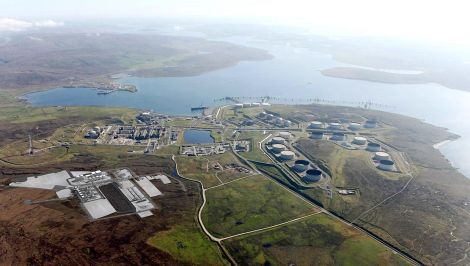Business / Oil boss says future is bleak without government intervention
Development chairman calls on SVT to ‘weather the storm’
THE UK’S oil and gas association OGUK is painting a bleak outlook for the industry without significant government intervention following the coronavirus pandemic.
A report by the organisation, which represents companies operating on the UK continental self, says that sentiment among supply chain companies had gone from positive at the start of the year to almost universally pessimistic in April.
This follows a crash in Brent crude to an 18-year low and a 30 per cent fall in global oil demand in two months. And the global gas price is now one-sixth of what it was at the start of the year at little more than 10p a cubic metre – the lowest in 14 years.
According to OGUK chief executive Deirdre Michie in a foreword to the report, many jobs will be lost in the coming months on top of those already announced.
Michie said: “Our current estimate is that up to 30,000 jobs could be lost over the next 12–18 months, if action to help the sector weather this storm is not successful. Only by concerted action across industry and governments can we begin to mitigate such damage.”
She added: “The outlook is bleak compared to the picture of steady growth seen only two months ago, before the grip of the pandemic became clear. For an industry just emerging from one of the most prolonged downturns in its history, this is especially concerning.
“The disruption caused by COVID-19 has been compounded by the rapid slump in commodity prices following the collapse in demand due to lockdown measures around the world. If not addressed, this set of challenges could result in lasting damage to the capabilities of the industry — harming our ability to provide secure and affordable energy now and in the future, as well as denting the prospects of the UK achieving net zero in the most effective and efficient way.”
Become a member of Shetland News
But Shetland Islands Council development committee chairman Alastair Cooper called on Sullom Voe Terminal to “weather the storm” and said that the industry had “been there before”.
Cooper was referring to an oil price crash in the 1990s when Brent Crude dropped to below $10 per barrel, he said. Operators had responded by hammering offshore production costs and had turned the corner.
In any case the oil low had proved a blip and prices had “soon” gone up again.
Cooper said: “One of the things we are looking for is for Sullom Voe to have a future and we accept just now with the reduced oil price that things need to change.
“A reduced oil price soon creeps back up again. We need to take stock and recognise this may be a transient thing.”
Cooper added that when the oil price came back, he could see Sullom Voe’s future as an energy hub for powering west of Shetland developments and for storing oil coming from the west.
Michie said that operators had already down-manned to essential personnel offshore to protect the health of the workforce, and “have also cut most discretionary activity in support of this and as a result of low commodity prices.
“As a result, new activity in the basin has stalled, investment plans have been postponed and major planned shutdowns delayed. Even after the lockdown eases, low commodity prices are likely to endure, slowing any recovery into 2021 and beyond.
“As our report shows, we are particularly concerned about the ability of the supply chain to absorb more pain. Contracts are already being deferred or cancelled and the longer-term pipeline of work is becoming increasingly uncertain.”
John Henderson of Lerwick based engineering company Ocean Kinetics said that supply companies to Sullom Voe had all received letters from operator EnQuest asking for them to reduce their costs by 30 per cent.
Henderson said that while that was impossible given the margins companies operated on, Ocean Kinetics would do its best to “help” at the present difficult time.
Henderson said that he had furloughed staff or had them working remotely wherever possible.
He hoped the Covid-19 crisis would trigger renewed interest from the oil companies in engaging the local supply chain.
This had been touted at an oil and gas meeting in Lerwick in 2018, organised by OGUK and Highlands and Islands Enterprise, but little had come of the high hopes.
EnQuest said in a statement: “In these challenging economic times, EnQuest PLC, in line with other companies in the oil and gas industry, is moving to review spending plans and reduce costs across its business. Consequently, the group is seeking a reduction in rates from its suppliers as part of the necessary adjustment to the current low oil price environment.
“Given the prevailing low oil price and global demand, the group has reviewed each of its assets and related spending plans. As previously announced, the group’s current expectation is for economic production at its Alma/Galia fields to cease in the second half of 2020. EnQuest has also stated it no longer plans to re-start production at the Heather and Thistle/Deveron fields and recently announced it is targeting $300 million of cost savings in 2020.”
Become a member of Shetland News
Shetland News is asking its many readers to consider paying for membership to get additional features and services: -
- Remove non-local ads;
- Bookmark posts to read later;
- Exclusive curated weekly newsletter;
- Hide membership messages;
- Comments open for discussion.
If you appreciate what we do and feel strongly about impartial local journalism, then please become a member of Shetland News by either making a single payment, or setting up a monthly, quarterly or yearly subscription.






























































